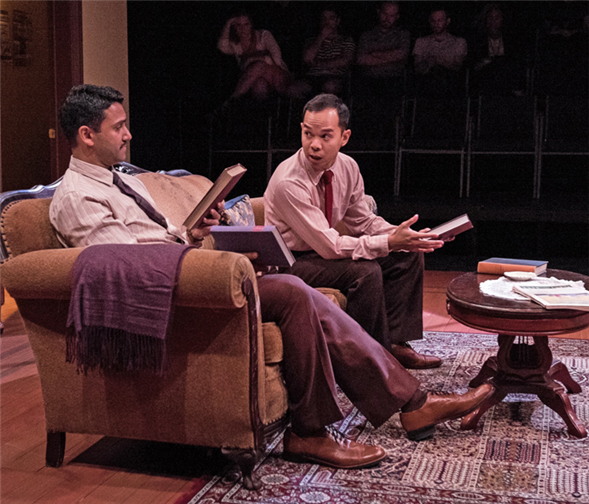Translate Page

Welcome to Building Character, our ongoing look at performers and how they create their roles
Like so many Clifford Odets plays, Awake and Sing! is bursting with passionate speeches – blasts of language that help his working-class characters realize who they are. Even newcomers to the show – which is being revived by the National Asian American Theater Company in a production at the Public Theater – should be able to locate the spirit that made Odets a flag bearer for Leftist politics in the 1930s, using his art as a rallying cry for people who were often left in the cold.
Yet for all that, one of the most striking moments in NAATCO's revival arrives in near silence.
It comes in the third act, after Ralph Berger (Jon Norman Schneider), a 22 year-old Bronx man trying to find his place in the world in 1933, asserts himself. He's realized how desperate his mother Bessie has become for his sister Hennie to have a respectable life, and he's denounced her devious behavior. In response, Bessie has gone on a tirade that includes smashing a beloved record that belongs to Ralph's grandfather Jake.
This is not just a random moment in a temper tantrum. Jake is a Marxist who tries to convince his family not to chain themselves to capitalist morality, and by smashing his album – a symbol of the beauty he sees in both art and the human spirit – Bessie breaks something in the old man as well. And since Ralph is hovering between value systems, trying to decide what kind of person he's going to become in the midst of the Depression, Bessie's behavior pushes him to a crisis of his own.
At first, however, he doesn't say anything about it. In NAATCO's production – which transfers to the Public after a successful run at Walkerspace in 2013 – Schneider takes the shards of the album to the family's dining room table. While everyone around him talks, he sits down and studies the pieces. Then he starts weeping. Violently. Yet he makes almost no sound. That makes him seem like an alien in his apartment full of blowhards, and it makes his agony even more lacerating.
For Schneider, part of Ralph's emotion comes from realizing that he's partly responsible for what Bessie has done. "It's an unexpected consequence of Ralph's outburst after realizing how totally despicable this household is," he says. "He's finding his legs at that moment and understanding how he really needs to get out from under Bessie's thumb and get out of this house somehow, but he doesn't foresee how this can result in this horrific thing happening to Jake."
That's not where it ends, however. As Schneider notes, Ralph's feelings quickly evolve. "What he wants becomes something different than just getting out," the actor says. "It's about him understanding that he has the agency to forge ahead on his own. He has legs; he has arms; he has blood of his own. It's not about running away. It's about staying and being a grown up person in this house and actually going after what he wants."
He adds that Stephen Brown-Fried, the show's director, has argued that the play hinges on the ability of the young characters to create their own views of the world.
"I didn't look at Ralph's journey that way in the last production," Schneider says. "I was still dealing with the intimidation of playing the role. The first time around, I was very intimidated by the language and even by wondering if I could pull it off in a believable and soulful way."
Schneider's underselling his earlier performance, which earned excellent reviews, but nevertheless, he insists he feels more connected to Ralph this time. "I always feel a swell in my chest at the end," he says. "I feel that sense of 'This is my time. This is our time. This is the moment when we go for what we want.'"
---
Mark Blankenship is the editor-in-chief of TDF Stages
Photo (L to R): Sanjit de Silva and Jon Norman Schneider. Photo by William P. Steele